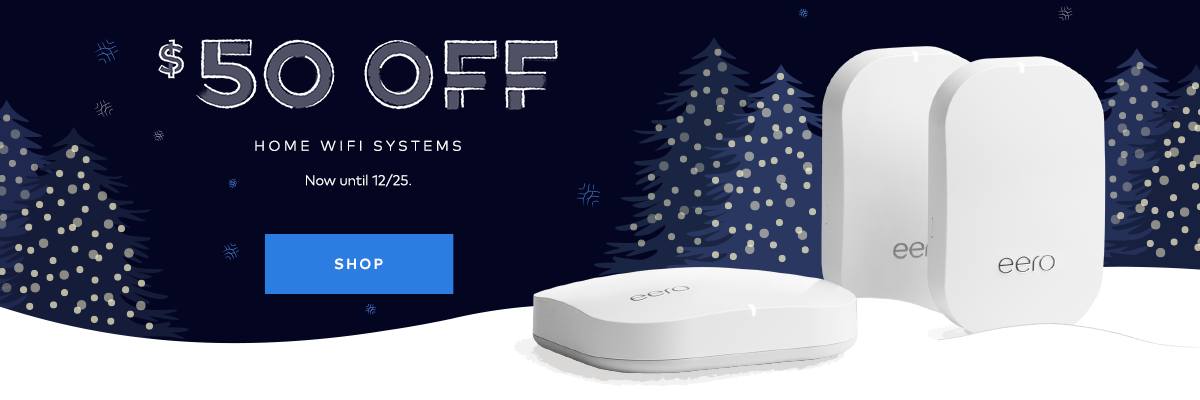
Coming in December, eero Plus members will be able to install the VPN service Encrypt.me on their supported devices to easily enable a VPN both when at home and away.
With the May 2017 congressional vote to block privacy protections from going into effect, people have been talking a lot about VPNs (Virtual Private Networks) to protect their online privacy.
In a nutshell, what lawmakers did was repeal privacy protections the FCC had established the year before. This move allows ISPs – Internet Service Providers like Comcast, AT&T, and other companies you use to get online – to continue to collect, store, share and even sell data like your browsing history, app usage information, location details, and more.
This high-profile reversal reminded people that ISPs can and do track this information and do have a financial incentive to share it with others, mainly marketers.
Cue the solution for the average person: VPNs. And while a VPN is a simple thing to use and rather affordable, how it works can be a mystery to the layperson and what protections it provides may be confusing.
Why would I use a VPN?
What is a VPN from Android Authority
Even if you absolutely do not care one bit about whether Google has a little side hustle earning money telling a marketing company what sites you’ve been visiting, or even what keywords are showing up in your emails and social media posts, you may want to take a look at a VPN.
Though the “privacy” angle has brought VPN questions back to the forefront, there’s another very pressing reason to consider using one: it’s the best tool to protect you from hackers and other data thieves when you’re on public Wi-Fi.
How does it work?
Typically, to connect to the Internet, you first connect to an ISP which then connects you with websites. All your data passes through the ISP’s servers and they can see it, record it, and track it. They could potentially have access to anything you type, click or otherwise interact with, submit, or transmit.
A VPN uses military-grade encryption to protect the data your computer receives and sends, which blocks the ISP from “reading” it, whether you’re using your Internet connection at home, at a coffee shop, at a hotel or anywhere else. Encryption is like a secret code that nobody except you and your intended receiver can read. Or, because the information is sent in secure information packets, you can picture your info as a parcel being sent via a courier who doesn’t have the combination to open the safe in which your parcel is being transported.
In addition to encrypting the information for you, your VPN can mask your true location, because you connect to the Internet via their server. This means only your VPN knows where you’re logging in from and what you’re doing online.
Technically speaking, but not too technically, a VPN is made up of: their server; a secret, sealed “tunnel” they create with their VPN protocols that directly connects your computer to their server; and encryption. Those are the components of the secure network they provide you.
What’s the advantage?
By encrypting everything you transmit, the VPN secures your data as it travels, which protects you from anyone trying to monitor your communications, whether a nosy neighbor, a thief or a potentially greedy ISP.
With a VPN, your ISP won’t know which sites you visit, because all your online activity is routed through the VPN’s server. All your ISP sees is that you are connected through the VPN server.
This way, you don’t have to worry about how secure the Wi-Fi connection you’re using is, nor do you have to worry about whether your ISP will, or will ever in the future, share or sell your information.
What’s the disadvantage?
Instead of your ISP or a hacker knowing what you’re up to and what sites you’re visiting, your VPN provider knows. So, it’s important to select one with a good reputation.
The other disadvantage is that your transmissions are routed to an extra server on their way to and from the website you’re visiting so it can slow down your connection.
You can reduce these issues by doing some research before you choose a VPN. By selecting one that has servers geographically closer to you or closer to the websites you plan to visit, you can reduce some of the connection slowdown. And during that research, you can also look into the reputation of the VPN and determine whether you trust them with your data.
You can research different VPNs using Google and at comparison sites, like The Best VPN.
How did VPNs come about?
Back in the 1990s, a Microsoft employee developed a protocol that created a more secure connection between a computer and the Internet. VPNs were developed to, essentially, allow a computer to securely connect to a private network over a public connection.
The technology was originally used by corporations to connect geographically distributed work sites securely, so employees who were traveling or telecommuting could access company information and resources remotely without their communications being intercepted. Companies still use it, and this is often the reason that a company laptop needs to be used to log in to work servers, why people sometimes must, grudgingly, take their work laptop on vacation, and how some major well-publicized security breaches have occurred when a secure laptop has been lost or stolen.
Nowadays, there are commercial VPN services that are simple to use and that anyone can buy so they can use the Internet privately and securely.
How can I get one?
First, you need to sign up for a reputable VPN service, which typically costs less than $10 per month. There are free services out there and some even get good ratings, but security experts generally recommend paid services. It’s worth feeling confident that the VPN you choose makes its money primarily from selling VPN services, rather than potentially needing to use customer data to monetize their business.
VPNs are easier to get, simpler to use and more affordable than ever, which is particularly timely with the increased awareness of hacking, security breaches and, now, your own ISP having carte blanche to use your personal data however they see fit.
With the increase in interest, VPN companies have made their products more user-friendly, with one-click installs and access. No longer does a user need to understand how to prep their operating system for a VPN. Some even offer mobile apps, so you can use your phone securely on public Wi-Fi.
Does a VPN make me totally anonymous online?
Basically, it keeps you anonymous in the moment from any entity outside the VPN itself. It does not protect you from law enforcement indefinitely, so if your hope is to get away with criminal activity, you can’t count on that from a VPN.
And if you log into an online account, the cookies and other tracking software from that site can identify you and track you during your session. That may not seem like much, except that a number of sites share cookie information, which is why when you use eBay, Amazon or Google to search for something, you will see ads for that item, or similar items, when you hop onto Instagram or Facebook. So, be aware that you can still be tracked by the sites themselves if you let them know who you are.
Also, your ISP can still tell that you’ve gone online and when, even if they can’t see what you’re doing. It’s hard to predict how that information could be used in the future, especially when combined with data from other sources, like your cell phone location or cameras around your home.
So, while it doesn’t provide complete anonymity, with a VPN you can increase your security and reduce the amount of personal information that is gathered by your ISP. And that could provide some peace of mind and a little more privacy.

You must be logged in to post a comment.